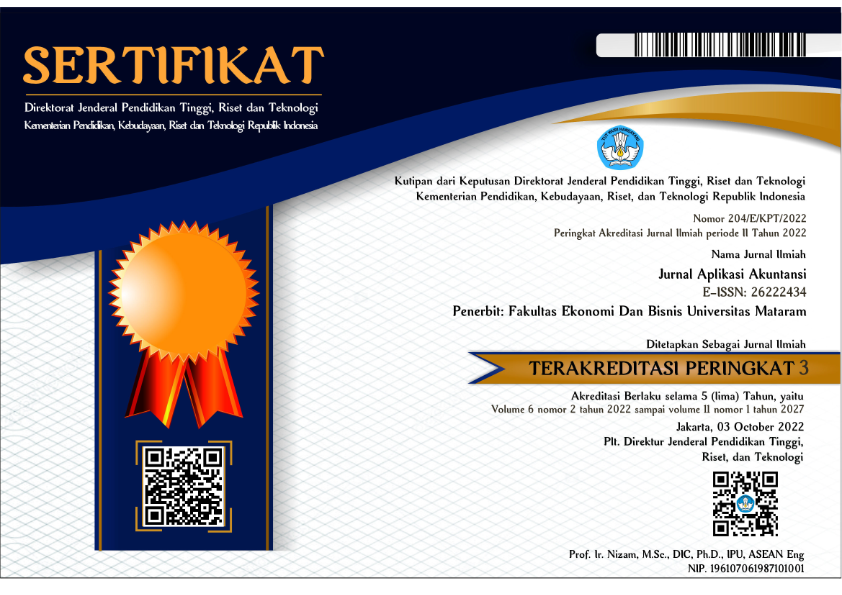ESG IMPACT ON POST M&A COMPANY VALUE IN SOUTHEAST ASIA
DOI:
https://doi.org/10.29303/jaa.v8i1.271Keywords:
ESG, post-M&A financial performance, merger and acquisitions, sustainabilityAbstract
This study examines the influence of ESG scores on the financial performance of post-M&A acquirer companies. The instrumental stakeholder theory views that high ESG performance could earn support from stakeholders for post-M&A synergy creation and financial performance. Previous studies have shown different results regarding the effect of ESG scores on a company's financial performance, thus indicating the ongoing relevance of this topic. Drawing on a sample of 135 M&A transactions in Southeast Asia, this study presents novel evidence of the financial benefits of ESG performance for acquiring companies. The findings of this research reveal a positive correlation between the ESG scores and post-M&A performance, thereby supporting prior research that aligns with instrumental stakeholder theory.
References
Ahern, K. R., & Fred Weston, J. (2007). M&As: The Good, the Bad, and the Ugly. In Journal of Applied Finance; Spring (Vol. 17).
Bettinazzi, E. L. M., & Zollo, M. (2017). Stakeholder Orientation and Acquisition Performance. Strategic Management Journal, 38(12), 2465–2485. https://doi.org/https://doi.org/10.1002/smj.2672
Cheng, B., Ioannou, I., & Serafeim, G. (n.d.). CORPORATE SOCIAL RESPONSIBILITY AND ACCESS TO FINANCE. http://ssrn.com/abstract=1847085Electroniccopyavailableat:http://ssrn.com/abstract=1847085
Cornell, B., & Shapiro, A. C. (2021). Corporate stakeholders, corporate valuation and ESG. European Financial Management, 27(2), 196–207. https://doi.org/10.1111/eufm.12299
Deng, X., Kang, J., & Low, B. S. (2013). Corporate social responsibility and stakeholder value maximization: Evidence from mergers. Journal of Financial Economics, 110(1), 87–109. https://doi.org/https://doi.org/10.1016/j.jfineco.2013.04.014
DePamphilis, D. (2019). Mergers, acquisitions, and other restructuring activities: An integrated approach to process, tools, cases, and solutions. Academic Press.
Dessaint, O., Golubov, A., & Volpin, P. (2017). Employment protection and takeovers. Journal of Financial Economics, 125(2), 369–388. https://doi.org/10.1016/j.jfineco.2017.05.005
Eccles, R. G., & Serafeim, G. (2013). The performance frontier. Harvard Business Review, 91(5), 50–60.
Eiteman, D. K., Stonehill, A. I., Moffett, M. H., & Kwok, C. (1989). Multinational business finance. Addison-Wesley Reading, MA.
Flammer, C. (2015). Does corporate social responsibility lead to superior financial performance? A regression discontinuity approach. Management Science, 61(11), 2549–2568.
FULL YEAR 2021 | LEGAL ADVISORS Global Mergers & Acquisitions Review An LSEG Business. (2022).
Jones, T. M. (1995). Instrumental Stakeholder Theory: A Synthesis of Ethics and Economics. In Source: The Academy of Management Review (Vol. 20, Issue 2). https://www.jstor.org/stable/258852
Rhodes-Kropf, M., & Robinson, D. T. (2008). The Market for Mergers and the Boundaries of the Firm. In THE JOURNAL OF FINANCE •: Vol. LXIII (Issue 3).
Servaes, H., & Tamayo, A. (2013). The impact of corporate social responsibility on firm value: The role of customer awareness. Management Science, 59(5), 1045–1061. https://doi.org/10.1287/mnsc.1120.1630
Shleifer, A., & Summers, L. H. (n.d.). Breach of Trust in Hostile Takeovers.
Zheng, Z., Li, J., Ren, X., & Guo, J. M. (2023). Does corporate ESG create value? New evidence from M&As in China. Pacific Basin Finance Journal, 77. https://doi.org/10.1016/j.pacfin.2022.101916
Downloads
Published
How to Cite
Issue
Section
License
Copyright (c) 2023 Mutiara Sihombing, Imo Gandakusuma

This work is licensed under a Creative Commons Attribution-NonCommercial-ShareAlike 4.0 International License.









